| Reviews & Columns |
|
Reviews DVD TV on DVD Blu-ray 4K UHD International DVDs In Theaters Reviews by Studio Video Games Features Collector Series DVDs Easter Egg Database Interviews DVD Talk Radio Feature Articles Columns Anime Talk DVD Savant Horror DVDs The M.O.D. Squad Art House HD Talk Silent DVD
|
DVD Talk Forum |
|
|
| Resources |
|
DVD Price Search Customer Service #'s RCE Info Links |
|
Columns
|
|
|
Hazel: The Complete Second Season
"Hazel, if you don't mind, this is a family affair."
"I know...that's why I want to give you a little advice."
A maid's outfit makes anyone look sexy...especially if they're wearing it to bake brownies. Shout! Factory, the savior of abandoned DVD releases of vintage TV series, has picked up where Sony left off six years ago and has released Hazel: The Complete Second Season, the 32-episode sophomore outing from the popular NBC sitcom's 1962-1963 television season. Starring Oscar-winning actress Shirley Booth, Don DeFore, Whitney Blake, and little Bobby Buntrock, Hazel's gentle, tender-hearted domestic-flavored comedy plays quite well fifty years later, aided immensely by the warm, amusing presence of incomparable Booth. The transfers are problematic...but vintage TV lovers won't even blink. No extras, unfortunately.
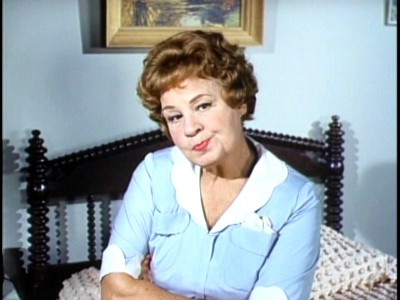
In a small, well-heeled suburban New York State town, live-in maid Hazel (Shirley Booth) runs the show at the Baxter residence. Nominal lady-of-the-house Dorothy "Missy" Baxter (Whitney Blake), who has nothing to do with the actual running of the house, is an interior decorator (...with apparently no clients) who has a rather sumptuous work studio out back. Hazel was Dorothy's maid when she was a child, and now her own son, Harold (Bobby Buntrock), sees the kindly Hazel as a surrogate mother, as well. Man-of-the-house George Baxter (Don DeFore), an often harried lawyer with a local law firm, sees Hazel as anything but a warm-hearted maternal figure―at least until he cools down―as the two spark continuously over their battle to see who actually is in charge of the Baxter home. Hazel is deferential to George...up to a point, always calling him, "Mr. B.," but she also loves to gently razz him and get his goat over silly, small points concerning the running of the house, while invariably butting into his business affairs that he conducts in his office den―not in a mean-spirited way, but rather as an expression of her always-honest, upfront, no b.s. personality. This grates on the short-tempered George, as it would any successful late 50s, early 60s American suburban male who (incorrectly) believed he was the king of his own castle.
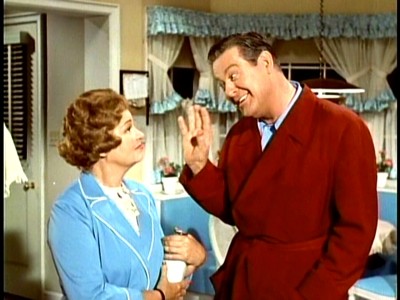
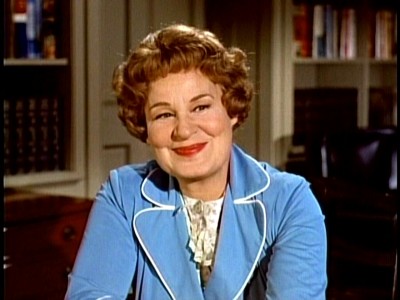
I can't remember the last time I watched Hazel, but it was ubiquitous on the afternoon analogue dials when I was growing up. Based on the world-famous one panel comic that cartoonist Ted Key made famous in The Saturday Evening Post (he also created the Peabody's Improbable History segment of The Rocky and Bullwinkle Show, as well as scripts for Disney films such as The Cat From Outer Space and Gus), Hazel the television series was a ratings phenomenon in its first year on NBC, landing immediately as the fourth most watched show in the nation for the 1961-1962 season. Known now primarily for this sunny little sitcom, actress Shirley Booth at the time of Hazel's debut was highly respected as one of the leading ladies of the American stage and screen, having won a Tony and Oscar for her role in Inge's Come Back, Little Sheba, as well as numerous other awards for other big-screen hits like The Matchmaker and Hot Spell (perhaps that's why critics were a little cool to the series, considering it "beneath" the high-powered Booth?). A smart businesswoman who understood that a hit TV show could reach more people in a single episode than all her theatrical performances combined, Booth owned a substantial piece of Hazel's back end (ahem), a savvy decision that ensured her life-long financial security when the series went into decades of profitable syndication runs.
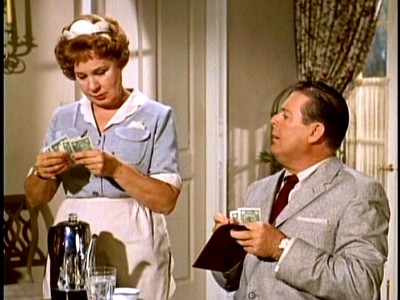
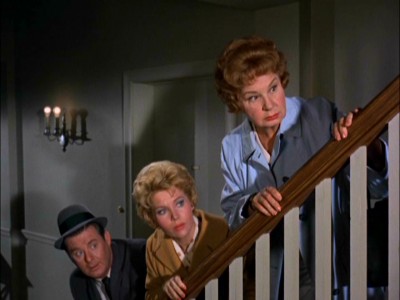
What struck me about Hazel after revisiting these 32 episodes was how gentle the comedy was, and how thoroughly it was drawn from Booth's characterization, rather than stemming from arbitrarily constructed gags. While it is true that the average Hazel episode breaks down into fairly recognizable patterns―Hazel starts the day pissing off George, who then either unsuccessfully tries to best Hazel or appease her if a larger problem looms due to her interference, before Hazel saves the day―the writers of the series (some of the best in the business at that time) always ground the comedic circumstances in Hazel's kindly, "everywoman" outlook on life, playing to Booth's strengths as a dramatic actress to give Hazel an underlying humanity that you don't expect from this kind of frothy domestic comedy. Unlike Key's creation, where Hazel is a bit of a wag, with a snappish wit and an almost imperious know-it-all attitude, Hazel here has been softened for the American living room. She's still a buttinski, and often times a know-it-all, but her actions are entirely without guile or mean-spiritedness. What she does, she does because "common sense" dictates she speaks up; she loves the Baxters like family, so why shouldn't she "forget her place" as George's snobby Boston blueblood sister Deirdre Thompson (Cathy Lewis) might put it, and speak up. If one of "Mr. B's" clients is fat, she tells him so (and takes away his brownie), without thinking he might be offended and cancel a contract with George; if you're fat, you're fat, Hazel would think―there's no crime in that. If she bowls better than Mr. B, she's going to show him that, without throwing a game to stay in good with her boss.
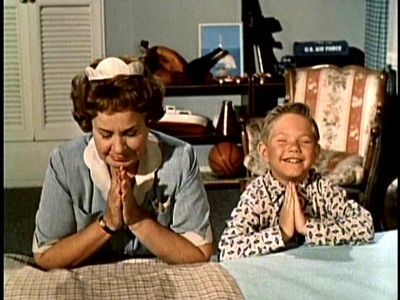
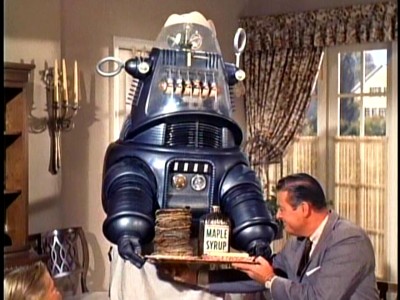
A fair amount of the comedic tension in Hazel comes from the constantly waged war of domestic authority between Hazel and Mr. B.―a potent sociological consideration during those times of changing domestic dynamics during the suburban housing boom. Hazel is "family" to Dorothy, whom she calls "Missy" ever since she took care of her as a small child. And she's a mother figure to loving Harold, too. Almost like a cranky aunt or helpful-but-interfering mother-in-law, she feels no compunction about trying to put out fires in the Baxter home while freely speaking her mind―which rankles authoritarian Mr. B. who wants to think he has the last word in the household...and who would prefer that Hazel revert to a silent, respectful servant when it suits him. So we never really know where Hazel stands with the Baxters. Will her smart mouth get her ass canned when George finally says enough is enough? Or will Missy stand up for her and remind hot-head George she means well? Or will Hazel (as usual) turn out to be right all along when it comes to whatever is wrong with George's home, or his business?
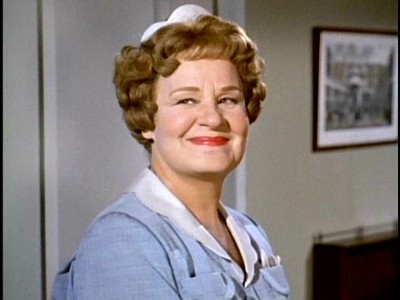
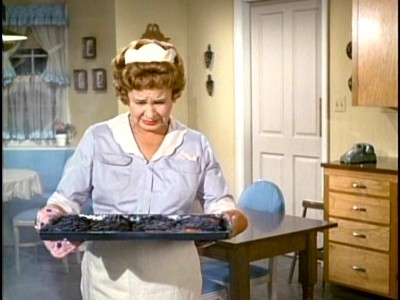
Cleverly, the producers and writers soften Hazel's intrusions, keeping her from coming off as too obnoxious, always framing her meddling as coming straight from the heart, and grounded in good old-fashioned, morally correct "horse sense." If some smart-assed, snobby socialite doesn't think Hazel is good enough, well...Hazel is gonna show 'em different―not by being as mean as they are (as would happen in a sitcom today), but by letting her natural goodness shine through, and thereby warming the snob's heart in the end. Of course it's fantasy, not only in the depiction of the rich but in the kind-hearted Hazel (and the completely bland Baxters, who merely serve as plot-driving set-ups rather than three-dimensional characters), but it works because of Booth's superlative technique. Hazel's outlook is always sunny, always positive, but the writers and Booth are smart to alert the viewer to an underlying sadness in her life that gives some heart and depth to the character. Over several episodes, Hazel mentions that she had to raise all her brothers and sisters when her mother died, denying her the chance to finish school ("I had no real education."), a loss the once-promising student still regrets. She also states she was already 24 by the time all her siblings were grown, giving us the sense that the best years of her youth were taken by this heavy responsibility. And later, when mistakenly interviewed for a society magazine, Hazel is stymied (and saddened) when asked if she had accomplished anything in her life; by the magazine's definition, she hadn't. Booth never lays on the treacle or the sobs with these scenes, letting just a flicker of wistful disappointment flash over her eyes to let us know that's there's more going on here in Hazel-land than just wacky vacuum cleaners and Mr. B. sneaking desserts.
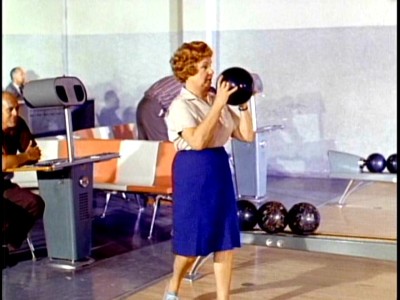
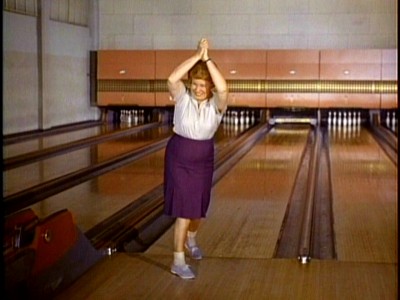
Good episodes this season include the premiere episode, Hazel's Cousin, an excellent distillation of how the series works in Hazel's innate goodness and sentimentality...and where Rosemary DeCamp's social secretary literally sniffs the wind like it's coming from the stables whenever Hazel shows up (and sure enough, Hazel is nice to her in the end). Rosie's Contract should be of interest to classic sci-fi fans when none other than Forbidden Planet's Robby the Robot shows up in a funny dream sequence that Hazel has when she fears she's being "automated" out of a job. We've Been So Happy Till Now gives a fun look at the extended network of maids, chauffeurs, butlers and tradesmen that operate behind the scenes and to which Hazel belongs (I wish they had done more with that concept: that network pulling strings behind their employers' backs). Barney Hatfield, Where Are You? seems to indicate that Robert B. Williams is going to stick around as Hazel's steady (he soon disappears), but it does have my favorite insensitive comment from "Mr. B." about Hazel's latest predicament: "Now, look, I know Hazel is worried...but could I have my coffee?" A Four-Bit Word to Chew On brings on delightful Howard Smith as George's bullying client, Harvey Griffin, who is calmed like a beast before music when Hazel whips out her kryptonite brownies (Griffin will come back frequently this season, and he's invariably hilarious; watch him beam like a little boy anytime Hazel mentions her own magical cooking). Natural Athlete is a fun match-up between Hazel and George, set in that most proletariat of arenas: the American bowling alley (good location work here at a real lane). Smoothy Robert Lowery (who looks uncannily like Gable from the side) is quite funny as a smarmy user/ladies man who turns all the neighborhood maids' heads in New Man in Town. Herbert for Hire has the bizarrely amusing next-door neighbors, Herbert and Harriet Johnson (Donald Foster and Norma Varden), who have no conception on how to work for a paycheck, so isolated have the once-rich couple now become (I love it when clueless Foster waits in Griffin's reception area, looking for a defunct Colliers or Liberty magazine...only to find a Playboy instead).
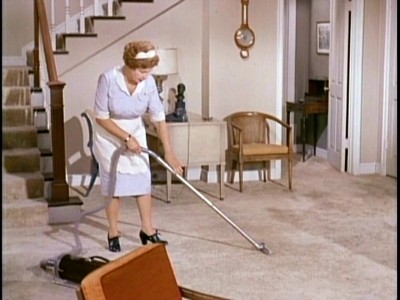
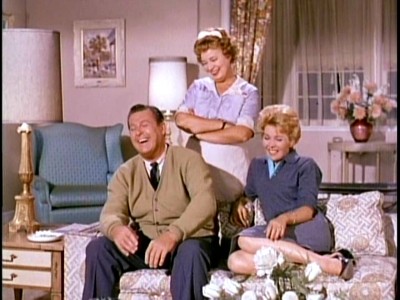
Hazel's Navy Blue Tug-Boats has a nice build of ever-more complicated problems for Hazel as she tries to make a shoe sale with Mr. B.'s borrowed car before he needs it for a business trip, with Hazel's Luck framing a similarly entertaining series of mishaps as chain letter-loving Hazel emerges triumphantly superstitious, much to the annoyance of logical lawyer George (more bowling in this one). Oh, My Aching Back shows the writers' savvy in tweaking the "Hazel is a buttinski" angle by having Missy tell her off: no more making George seem like he doesn't know anything in front of little Harold, which good soul Hazel immediately regrets...even though Mr. B. is wrong. With a script by no less than Dorothy Cooper Foote, Hazel's Day Off is a charming episode about the insanity of the modern, rushed lifestyle (if they thought it was out of control in '62, can you imagine how'd they view today?), where Hazel helps one of George's harried clients (James Westerfield) remember what it was like to be carefree, even just for one day, giving him her delicious brownies, getting him to play with hand puppets in the park...and letting him fix her water heater (dirty and sweaty, the once ferocious client grins and waves like a happy teenager at George as handles that monkey wrench). This season's best episode, So Long, Brown Eyes, written by the marvelous Peggy Chantler, comes last. An old flame of Hazel's comes back to town, impetuously asking her to marry him as they try and recreate their dates from twenty years before. Sadly, nothing is the same anymore (their favorite restaurant is boarded up, their favorite hamburger joint invaded by rude kids calling them "squares" behind their backs), and Hazel says goodbye to free-spirit Patrick McVey. Back home, Harold, worried sick that Hazel will fall in love again and leave the Baxter household, falls asleep in her chair, waiting for her. Hugging her tightly when she wakes him, he asks to marry her when he grows up, and Booth, expertly, accepts, tears in her eyes as she asks him for a kiss. It's as true, as good a moment for Booth as anything I've ever seen her do, a heart-tugging, real moment in a fluffy, funny little sitcom that nobody thinks too much of anymore.
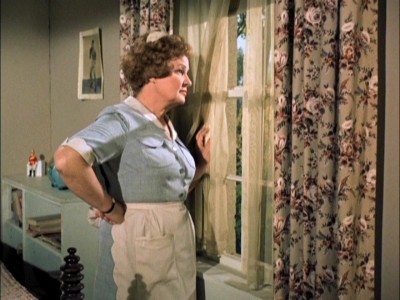
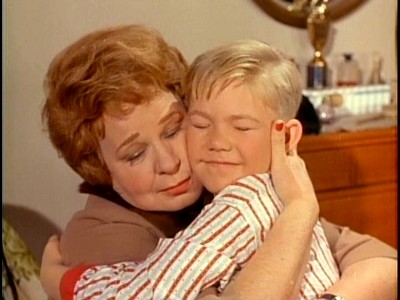
The DVD:
The Video:
The full-screen, 1.33:1 color transfers for Hazel: The Complete Second Season are all over the place (due to the original source materials and not because of Shout!), with image fidelity resembling bad VHS dupes, to just-reasonable syndication prints. Color can be a sickly yellow, or washed out, or close to original. Picture detail and image is fuzzy most of the time, and ghosting is a problem. Not the best...but still better than the snowy black and white image I used to get on my rabbit ears portable.
The Audio:
Hey, Hazel experts: were the first 11 episodes of this second season originally without a laugh track? Or were those somehow taken out during syndication? I haven't seen the first season in years and years, but I seem to remember a laugh track, so.... At the twelfth episode the laugh track appears; overall, the English mono audio track is serviceable, with noticeable hiss and no subtitles or closed-captions.
The Extras:
No extras for Hazel: The Complete Second Season.
Final Thoughts:
A gentle, fun, light sitcom with heart. When that swinging, brassy, playful theme music starts up, and you see Shirley Booth put her head down like a bulldog and pump those plump little arms as she runs purposefully around the Baxter residence, it's difficult not to be charmed by this sweet little show―particularly when Booth is so adroit at shading the always sunny...but sometimes sad, Hazel. The original source materials for the transfers are not optimal by any stretch, but vintage TV fans will forgive them. I'm highly recommending Hazel: The Complete Second Season.
Paul Mavis is an internationally published film and television historian, a member of the Online Film Critics Society, and the author of The Espionage Filmography.


|
| Popular Reviews |
| Sponsored Links |
|
|
| Sponsored Links |
|
|
| Release List | Reviews | Shop | Newsletter | Forum | DVD Giveaways | Blu-Ray | Advertise |
|
Copyright 2024 DVDTalk.com All Rights Reserved. Legal Info, Privacy Policy, Terms of Use,
Manage Preferences,
Your Privacy Choices | |||||||














